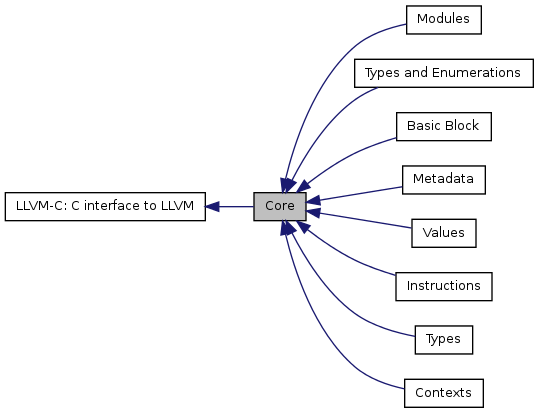
|
Modules | |
| Types and Enumerations | |
| Contexts | |
| Modules | |
| Types | |
| Values | |
| Metadata | |
| Basic Block | |
| Instructions | |
Typedefs | |
| typedef void(* | LLVMFatalErrorHandler )(const char *Reason) |
Functions | |
| void | LLVMInitializeCore (LLVMPassRegistryRef R) |
| void | LLVMShutdown (void) |
| char * | LLVMCreateMessage (const char *Message) |
| void | LLVMDisposeMessage (char *Message) |
| void | LLVMInstallFatalErrorHandler (LLVMFatalErrorHandler Handler) |
| void | LLVMResetFatalErrorHandler (void) |
| void | LLVMEnablePrettyStackTrace (void) |
Detailed Description
This modules provide an interface to libLLVMCore, which implements the LLVM intermediate representation as well as other related types and utilities.
LLVM uses a polymorphic type hierarchy which C cannot represent, therefore parameters must be passed as base types. Despite the declared types, most of the functions provided operate only on branches of the type hierarchy. The declared parameter names are descriptive and specify which type is required. Additionally, each type hierarchy is documented along with the functions that operate upon it. For more detail, refer to LLVM's C++ code. If in doubt, refer to Core.cpp, which performs parameter downcasts in the form unwrap<RequiredType>(Param).
Many exotic languages can interoperate with C code but have a harder time with C++ due to name mangling. So in addition to C, this interface enables tools written in such languages.
Typedef Documentation
| typedef void(* LLVMFatalErrorHandler)(const char *Reason) |
Function Documentation
| char* LLVMCreateMessage | ( | const char * | Message | ) |
Definition at line 65 of file Core.cpp.
References llvm::LibFunc::strdup.
Referenced by LLVMGetDiagInfoDescription().
| void LLVMDisposeMessage | ( | char * | Message | ) |
Definition at line 69 of file Core.cpp.
References llvm::LibFunc::free.
| void LLVMEnablePrettyStackTrace | ( | void | ) |
Enable LLVM's built-in stack trace code. This intercepts the OS's crash signals and prints which component of LLVM you were in at the time if the crash.
Definition at line 149 of file PrettyStackTrace.cpp.
References llvm::EnablePrettyStackTrace().
| void LLVMInitializeCore | ( | LLVMPassRegistryRef | R | ) |
| void LLVMInstallFatalErrorHandler | ( | LLVMFatalErrorHandler | Handler | ) |
Install a fatal error handler. By default, if LLVM detects a fatal error, it will call exit(1). This may not be appropriate in many contexts. For example, doing exit(1) will bypass many crash reporting/tracing system tools. This function allows you to install a callback that will be invoked prior to the call to exit(1).
Definition at line 131 of file ErrorHandling.cpp.
References bindingsErrorHandler(), llvm::install_fatal_error_handler(), and LLVM_EXTENSION.
| void LLVMResetFatalErrorHandler | ( | void | ) |
Reset the fatal error handler. This resets LLVM's fatal error handling behavior to the default.
Definition at line 136 of file ErrorHandling.cpp.
References llvm::remove_fatal_error_handler().
| void LLVMShutdown | ( | void | ) |
Deallocate and destroy all ManagedStatic variables.
- See also:
- llvm::llvm_shutdown
- ManagedStatic
Definition at line 59 of file Core.cpp.
References llvm::llvm_shutdown().
 1.7.6.1
1.7.6.1